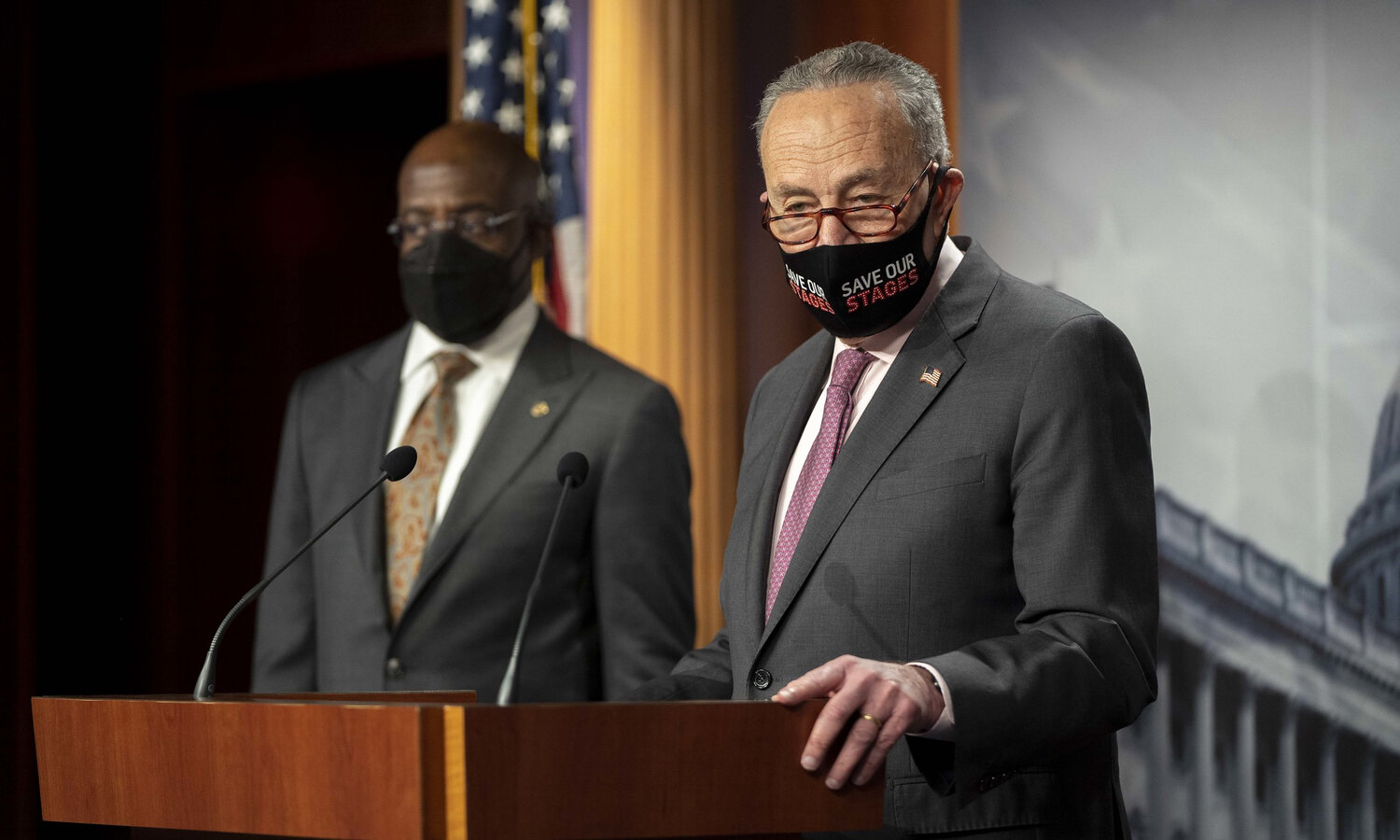The February 2021 US Policy Update.
Senate Majority Leader Chuck Schumer (D-NY) and Senator Reverend Raphael Warnock (D-GA) during a press conference outlining COVID relief efforts on February 11th. Source: Flickr
Competition Law Continues To Build Heat
On February 4th Senator Klobuchar (D-MN) introduced the Competition and Antitrust Law Enforcement Reform Act. The bill is co-sponsored by Judiciary Subcommittee on Antitrust and Commerce Committee members Richard Blumenthal (D-CT), Cory Booker (D-NJ), Ed Markey (D-MA), and Brian Schatz (D-HI). Sen. Klobuchar was quoted as saying “We are ruining capitalism by allowing monopolies to destroy nearly every industry.” The sweeping legislation proposes to increase enforcement resources, strengthen prohibitions against anticompetitive mergers, and creates new provisions prohibiting “exclusionary conduct”. Notably, it also establishes a new independent FTC division to study markets and retrospectively assess mergers, and implement a series of reforms designed to seek civil fines for antitrust violations.
While reforms in the competition space are long overdue, many are concerned with the impact the sweeping legislation would have on venture capital and the nature of the tech startup community. Increased government involvement in mergers and acquisitions would negatively impact funding and effectively eliminate exit opportunities for developers seeking to sell their companies at a profit.
President Biden’s nominee for Attorney General, Merrick Garland, vowed to vigorously enforce antitrust laws, indicating he has ‘no conflicts’ of interest when it came to possible prosecution of large tech platforms. The Alliance is urging a cautious approach focused on increasing transparency and accountability while preserving the competitive ecosystem developers depend on.
Privacy Or Public Health?
After privacy concerns derailed contact tracing efforts for COVID-19 last year, health data privacy remains a priority of lawmakers. The Public Health Emergency Privacy Act — first introduced at the start of the pandemic — was reintroduced with additions in the new Congress to push the legislation forward. The initial bill set forward privacy protections surrounding health information sharing on contact tracing apps and efforts to gain user confidence for sharing their COVID-related information. The reintroduced bill hopes to build trust and revitalize containment efforts by offering many of the same promises as last congress’s proposed bill while updating proposals to include patient information surrounding vaccines, which are now (thankfully!) part of the equation.
Additionally, Senator Wyden (D-OR) is revisiting his efforts from the previous congress over national privacy legislation. A new bill, which should drop shortly, is said to prevent law enforcement agencies from obtaining the personal data of consumers without a prior warrant or court order.
Once Again, Section 230
Just because it’s a new Congress and Trump hasn’t tweeted about it doesn’t mean politicians have forgotten about their hatred of Section 230. Discussion drafts continue to circulate for how to reform the platform liability shield. Recent proposals have increasingly focused on how Section 230 reform is needed to prevent the civil liberties violations that occur online, specifically through targeted advertising. Civil rights groups however are split on how to handle the legislation, with some believing reform needs to err on the side of censorship and others believing more marginalized voices need to be heard more.
Federal Digital IDs May Be Coming
Developers Alliance has long discussed the prospect of a digital ID, and bills promoting just that are now being revived. Tech-savvy member of congress Rep. Bill Foster (D-IL) introduced his bipartisan Improving Digital Identity Act last year. Rep. Foster has indicated, however, that he would like this act too to see a second life and plans to reintroduce it in the coming weeks. Chances are high this bill will gain traction in the Senate given its content and bipartisan nature. The bill would:
-
…establish a task force to bring together key federal agencies with state and local government representatives. This task force would develop secure methods for government agencies to validate identity attributes to protect the privacy and security of individuals as well as supporting reliable, interoperable digital identity verification tools in the public and private sectors.
-
…direct the National Institute of Standards and Technology (NIST) to create a new framework of standards to guide government agencies when providing digital identity verification services – emphasizing privacy and security.
-
…establish a grant program within the Department of Homeland Security to allow states to upgrade the systems they use to issue drivers’ licenses and other types of identity credentials, and to support the development of secure, interoperable state systems that enable digital identity verification per the framework developed by NIST.




